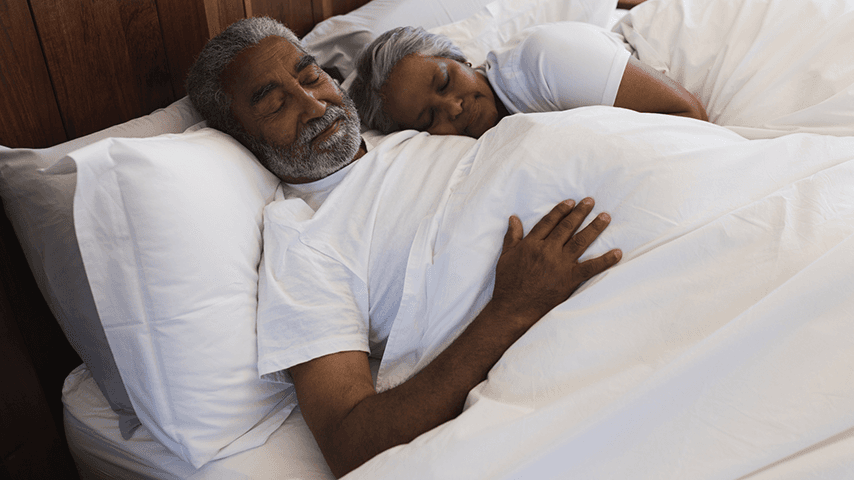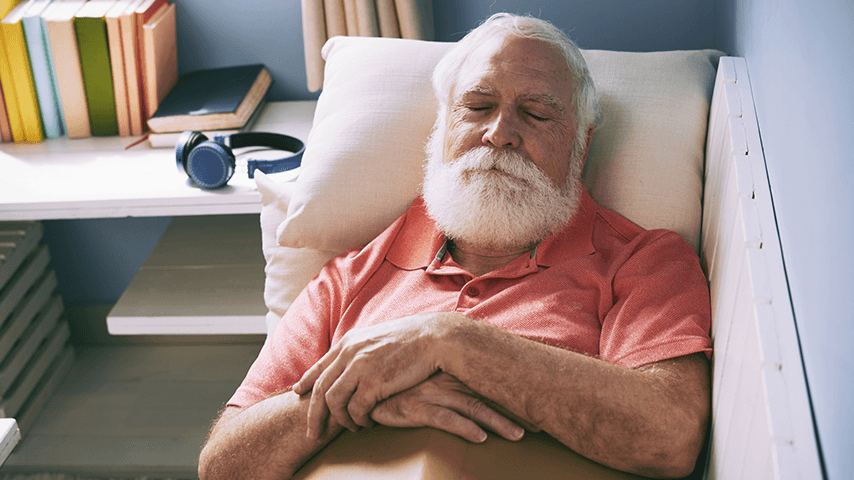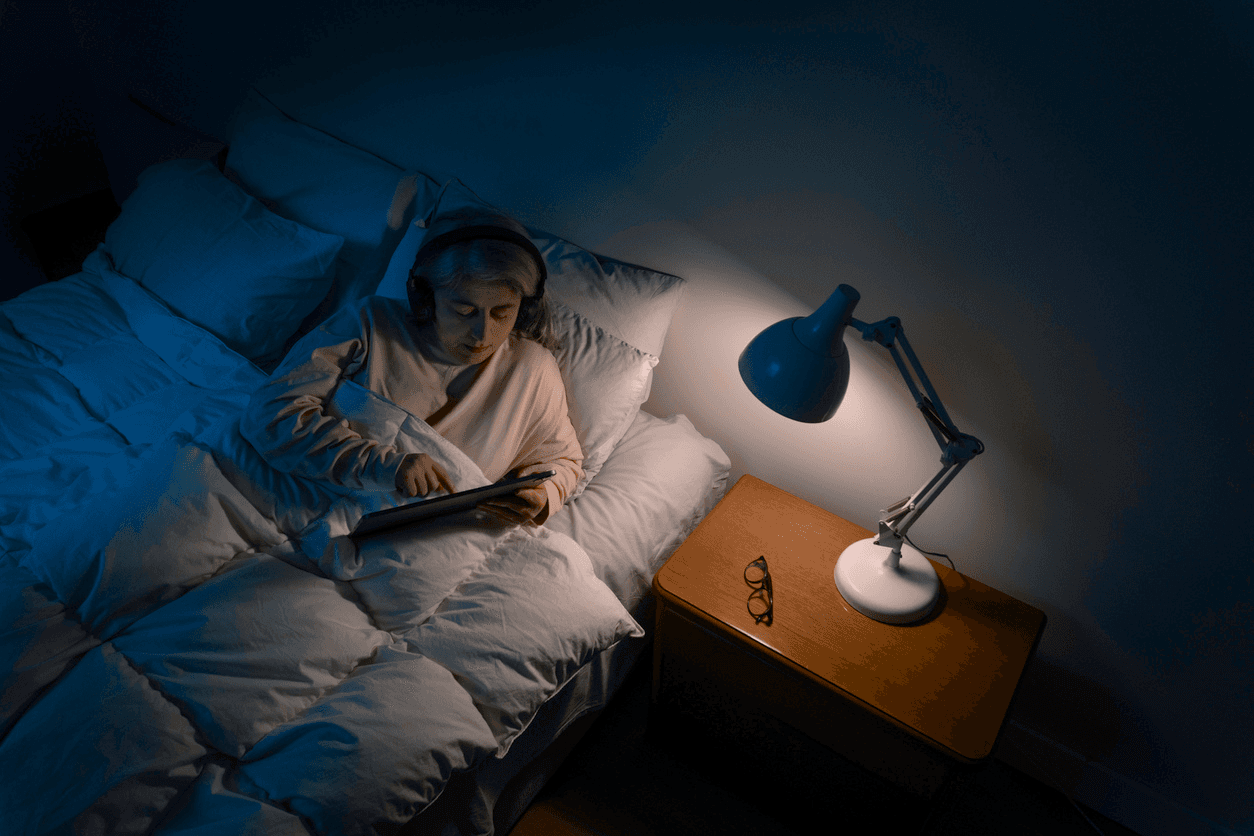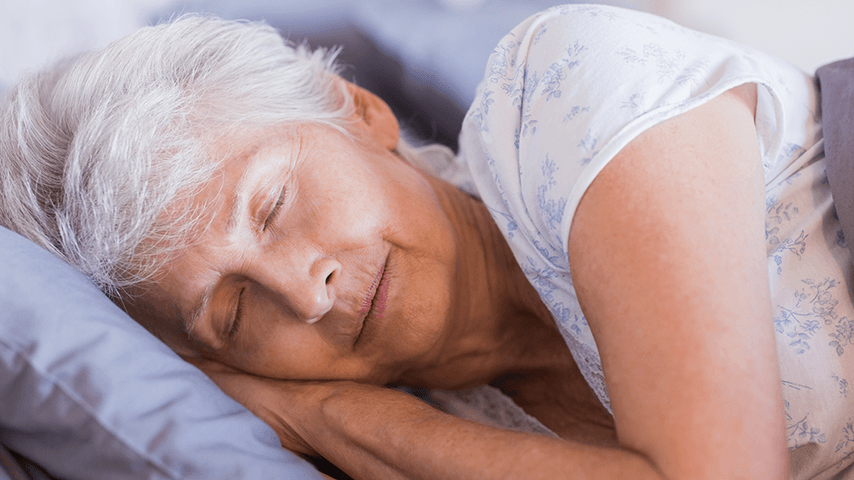
Related Topics
Here’s an interesting fact: Our ability to recall things that happen when we’re awake depends on what happens while we’re asleep.
“It sounds counter-intuitive,” noted Dorothea Vafiadis, Senior Director of NCOA’s Center for Healthy Aging. “Why would something that feels very active—like creating memories from conscious experiences—be related to sleep? Don’t we solidify our memories in the present moment?”
Researchers have been exploring that question for more than a century,1 and what they’ve found is fascinating. As it turns out, the answer is both yes and no. Some functions of memory happen while we are awake. Others occur overnight. And having the sharpest memory possible depends on supporting those sleep-related functions as best we can.
“This is really good news,” Vafiadis said. “Because when we understand this direct relationship between memory and sleep, we can take charge of improving both.”
This practical knowledge is doubly empowering, especially as we age. That’s because certain risk factors for insomnia—like chronic illness, some prescription medications, and social isolation—tend to rise the older we get. Yet it can be hard to recognize the many negative health effects of sleep deprivation, including on cognition. In many ways, adopting strategies for getting better-quality sleep can address worrying symptoms that we might otherwise blame on age-related decline.
Ready to learn more? Here's what you need to know about memory, sleep, and the cognitive benefits of getting enough rest.
What is memory?
Most of us think of “memory” as a storage box—one whose files we mentally rifle through when we need to recall something. That “something” could be a fact, like someone’s name; a skill, like how to knit; or an event, like a favorite relative’s wedding.
Memory certainly does serve as our brain’s storage box. But it’s more than that. Memory involves the very act of putting files into that box in the first place.
“All those facts, the things we’ve learned, the events we’ve attended—they don’t just automatically land in our memory,” Vafiadis explained. “There’s an active cognitive process that our brains must go through in order to assemble and save those files for later.”
Scientists refer to that process as memory encoding. Memory encoding is the first of three steps involved in human memory,2 which are:
- Memory encoding
This is a complex process that researchers still do not fully understand. In basic terms, encoding happens when our brains convert sensory input into stored information. So, for example, when someone introduces themselves, our brains encode what we hear into a form we can access later. - Memory storage
This is the brain’s filing system—the place where encoded memories get organized. Like most filing systems, this one includes dividers that sort encoded memories into a few sections:- Short-term memory—where small bits of information are held for a limited amount of time (often measured in seconds or minutes).3 For example, when someone tells you the phone number for a business you need only to call once, your brain stores that number in your short-term memory just long enough so you can dial it.
- Long-term memory—where unlimited amounts of knowledge, experiences, and skills are held indefinitely.4 For example, that new shirt you wore on the first day of high school? Your brain might have stored its color, the way its collar felt, and how the material smelled in your long-term memory.
Importantly, long-term memory storage involves another process called consolidation, which we’ll talk about below.
- Memory retrieval
This is the act of recall—going to the storage box, finding the right memory file, and taking the encoded information out of it.
What is memory consolidation?
Most memories start out as short-term memories.5 And when it comes to learning, retaining, and recalling information over a lifetime, that could be a problem.
Fortunately, our brains have a process in place to convert newly encoded short-term memories into long-term ones. Scientists call this process memory consolidation.5
To understand how memory consolidation works, it’s first necessary to understand that our brains don’t store every piece of information related to a specific memory in the same place.
“I like to compare this to how my home is organized,” Vafiadis offered. “I have socks in my dresser drawer; shirts in my bedroom closet; shoes in the hallway; and coats on a rack by the door. When it’s time to get dressed, I need to visit each place for a specific piece of clothing that, together, create an outfit for the day.”
It’s the same with memory consolidation. During this fascinating process, our brains “look around” for the many sensory inputs associated with a specific fact, episode, or learning experience. Because these inputs live in different places—or neural networks—our brains must take these inputs and assemble them for long-term storage.
How are memory consolidation and sleep related?
Some consolidation happens while we’re awake and can direct what’s happening. But research suggests that most of it happens during sleep.
Why? Perhaps researcher Gabrielle Girardeau explained it best: because “sleep provides a window of opportunity for the brain to sort and reinforce newly encoded memories in absence of the incessant barrage of external information.”6
Girardeau’s research—independently corroborated by many other scientists and studies in the field—found that memory consolidation happens during “slow-wave” sleep.6
“Slow-wave” sleep is part of the normal sleep cycle, which has two phases (non-REM and REM) and four stages:7
- Stage 1 (NREM; about 5-10 minutes)
- Stage 2 (NREM; about 25 minutes)
- Stage 3 (NREM; about 20-40 minutes)
- Stage 4 (NREM; about 10 minutes)
Our brains are least active during Stages 1-3. After transitioning from wakefulness to sleep during Stage 1, everything slows down: our vital signs, our body thermostat, and our brain waves. Then we fall into deep sleep—the time when our brains sift through daily short-term memories, activate all those neural networks, and store new knowledge for later.
What is sleep’s impact on memory performance?
Restorative sleep is key to our physical and cognitive health. And in order to achieve it, we need to cycle through each of the four stages of sleep between four and six times per night.
“That’s why getting enough sleep—and the right kind of sleep—is so important,” said Vafiadis. “When we’re sleep deprived, our memories can’t and don’t perform as well as they should. We need a good night’s sleep to ensure that our mental health is sharp and to enhance our overall well-being.”
Many factors contribute to sleep deprivation. Life events, like losing a loved one, moving homes, or having a stressful job, can lead to anxiety and keep us awake through the night. Certain chronic illnesses and medical conditions, such as restless leg syndrome, arthritis pain, or sleep apnea, can interrupt our sleep. And even certain lifestyle choices, like what we eat and when, and whether we enjoy an evening glass of wine or a cocktail, can get in the way of restorative sleep.
And this sleep deprivation negatively impacts our brains in several ways:8,9
- Our cognitive abilities slip.
- We don’t learn things as easily or as well.
- We’re more prone to forgetfulness.
- Our recall may become unreliable.
It doesn’t take long, either. Sleep specialists have discovered that just one night of getting fewer than six hours of sleep can impair our ability to form and consolidate memories.10
On the flip side, getting sufficient sleep has many cognitive benefits, including:11
- Better emotional regulation
- Improved mental sharpness
- Heightened ability to focus, learn, and remember things
- Healthier brains overall
Practical tips for getting better sleep—and boosting memory, too
So what’s the trick for getting sufficient sleep as we age?
“Most experts say that older adults need between 7-9 hours of sleep each night on average,” Vafiadis said. “If you struggle to hit this target on a regular basis—and many of us do—I recommend starting with good ‘sleep hygiene’ practices.”
Good sleep hygiene means getting rid of bad sleep habits and forming new ones that signal our bodies and minds that it’s time to wind down. For example, you might try:
- Keeping a regular sleep schedule. Going to bed and getting up at the same time each day reinforces your body’s natural sleep cycles.
- Reserving your bedroom for sleep. This trains your brain to connect one with the other. Keep the temperature comfortable and try not to eat, work, or watch TV here.
- Avoiding food and drinks too close to bedtime. A full stomach can keep you awake. Caffeine and alcohol can disrupt your sleep. So can having to pee in middle of the night.
- Reducing your screen time. “Blue light” from digital devices disrupts circadian rhythms, especially within an hour of turning in. And media consumption can be upsetting.
- Developing an evening routine. Help your body and mind to wind down by engaging in a quiet, soothing activity: take a bath; write in a journal; listen to some relaxing music.
- Addressing anxiety around sleep. If you wake up overnight and can’t fall back asleep, don’t worry. Get out of bed and try reading or another calm activity until you feel sleepy.
Beyond sleep hygiene specifically, there are other positive lifestyle changes you can make that are linked to better sleep. These include:
- Managing stress. Practicing mindfulness can calm racing thoughts, slow your heart rate, relax tensed-up muscles, and create a sense of well-being.
- Eating better. Following a healthy diet can help prevent some chronic diseases and the need for some medications, both of which can interfere with sleep.
- Limiting alcohol. A nightly glass of wine might help you fall asleep—but it won’t keep you there. Cutting back supports a healthier overall sleep cycle and more.
- Getting regular exercise. Physical activity can lower your blood pressure, reduce anxiety, ease certain types of pain, and boost your mood.
- Staying socially connected. Reducing loneliness can improve your sleep, too. Volunteer, attend a lecture, or take a class at your local community center.
Finally, you might think about whether a new mattress might help. A better mattress can help address common issues contributing to sleep deprivation, including:
- Sleep apnea and snoring. Elevating your head and back can help.
- Chronic pain. Pain causes poor sleep, and poor sleep worsens pain.
- Menopause. Regulating your overnight temperature can boost your comfort and ability to stay asleep.
If you haven’t replaced your mattress in a while, consider investing in the best mattress you can afford.
The bottom line
As we age, our risk factors for insomnia tend to rise. Things like chronic pain, prescription medications, social isolation, and not getting enough exercise all can get in the way of a good night’s sleep. Yet it can be hard to recognize the many negative health effects of sleep deprivation, including on memory and cognition. In many ways, adopting strategies for getting better-quality sleep can address troubling symptoms we might otherwise blame on age-related decline. When we better understand the connection between memory and sleep, we can take practical steps to improve both.
Sources
1. Björn Rasch, et al. About Sleep’s Role in Memory. Physiological Reviews. April 2013. Found on the internet at https://www.ncbi.nlm.nih.gov/pmc/articles/PMC3768102/
2. Saul McCleod, PhD. Memory Stages: Encoding Storage And Retrieval. Simply Psychology. June 16, 2023. Found on the internet at https://www.simplypsychology.org/memory.html
3. Saul McCleod, PhD. Short-Term Memory In Psychology: Types, Duration & Capacity. Simply Psychology. Oct. 4, 2023. Found on the internet at https://www.simplypsychology.org/short-term-memory.html
4. Saul McCleod, PhD. Long-Term Memory In Psychology: Types, Duration & Capacity. Simply Psychology. June 16, 2023. Found on the internet at https://www.simplypsychology.org/long-term-memory.html
5. Kendra Cherry, MSEd. What is Memory Consolidation? VeryWell Mind. Nov. 6, 2023. Found on the internet at https://www.verywellmind.com/what-is-memory-consolidation-2795355
6. Gabrielle Girardeu, et al. Brain neural patterns and the memory function of sleep. Science. Oct. 28, 2021. Found on the internet at https://www.science.org/doi/10.1126/science.abi8370
7. Cleveland Clinic. Sleep: How Much You Need and Its 4 Stages. Dec. 3, 2021. Found on the internet at https://health.clevelandclinic.org/your-complete-guide-to-sleep
8. Cleveland Clinic. Here’s What Happens When You Don’t Get Enough Sleep. May 29, 2024. Found on the internet at https://health.clevelandclinic.org/happens-body-dont-get-enough-sleep
9. Cleveland Clinic. How Long Can You Go Without Sleep? Dec. 28, 2022. Found on the internet at https://health.clevelandclinic.org/how-long-can-you-go-without-sleep
10. Dani Blum. How Sleep Deprivation Can Affect Memory. The New York Times. Feb. 9, 2024. Found on the internet at https://www.nytimes.com/2024/02/09/well/mind/sleep-memory.html
11. American Heart Association . Sleep Your Way to a Smarter Brain. Found on the internet at https://www.heart.org/en/healthy-living/healthy-lifestyle/sleep/sleep-your-way-to-a-smarter-brain



